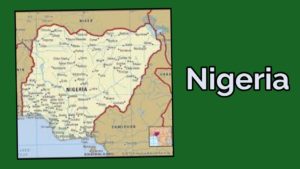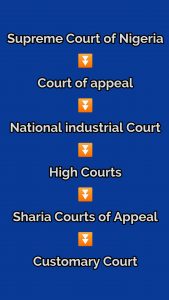If you have been searching for the features or characteristics of Nigerian Legal system, then you are in the right place. In this article, we will be looking at the 7 major characteristics of the Nigerian Legal system and how the come into play in the system. I enjoin you to read carefully as I tide you over.

When you think of a system, what comes to mind? A system simply means various components working together for the proper functioning of a machine. That is the simple definition of a system.
Now what is a legal system? It simply means the whole legal structure of Nigeria working together. Nigeria legal systems refer to those various components the make up the Nigerian legal structure. It’s quite straightforward.
The study of the legal system helps law students to understand how the law of the country where they’ll practice law functions. Every countries legal systems is different, so it’s quite important that you make an effort to understand the legal system of any country you find yourself.
Also read:
Differences between the 1960 & 1963 constitution of Nigeria
Features of the 1979 constitution of Nigeria
How to sue someone to court in Nigeria
Nigeria belongs to the common law family, this is because English law makes up a substantial part of the Nigerian law. Nigeria though now a sovereign nation was once under British rule. When Nigeria gained independence in 1960, they copied a lot of English laws. Most of the laws which they copied have now been repealed in England. Nigeria also received all laws that were in force in England on 1st January, 1900. Now let’s look at the features of the Nigerian legal system.
Characteristics of Nigerian Legal System
Below are the characteristics of the Nigerian Legal System:
- Duality
- Judicial Precedent
- Hierarchy of courts
- Fusion of legal profession
- External influence
- Accusatorial
- Military influence
Let’s now explain these terms for better comprehension:
1. Duality:
Before the advent of the British, there existed in the geographical entity called Nigeria various ethics groups. Those ethic groups have their own customary laws. The British colonized Nigeria and introduced the English law. Now the English law existed side by side with the Customary law.
2. Judicial precedent:
Judicial precedent is one of the major characteristics of Nigerian legal system. In Nigeria, the courts operate based on judicial precedent. Judicial precedence here simply means that once a Superior court takes a decision the lower Court is bound to follow it.
It does not lie in the mouth of a lower court to call the decision of a Superior Court per incuriam. When a court takes a decision without acknowledging a precedent set by a higher court that decision is said to be per incuriam (judgement given in error).
3. Hierarchy of courts:
The Nigerian legal system has what is known as hierarchy of courts. This hierarchy places the Supreme Court at the top of the ladder, followed by the court of appeal, federal high Court, industrial Court, state high Court, Magistrate Courts, sharia courts, customary courts. It also includes the precedence system stated above.
For a better explanation of the hierarchy of courts, kindly read a comprehensive article on the hierarchy of courts in Nigeria.

4. Fusion of legal profession:
In a Nigeria the legal profession is fused. In Nigeria when one is called to bar, it is termed Barrister and solicitor of the Supreme Court.
This is quite different from the system practiced in England. In England barrister and solicitor are two different profession.
Also read:
Advantages and disadvantages of a written constitution
Advantages and disadvantages of an unwritten constitution constitution
Differences between a rigid and flexible constitution
5. External influence:
There has been some external influence in the Nigerian legal system. This simply refers to the introduction of English law into the Nigerian legal system. As Earlier stated alot of English laws were copied by Nigeria when they gained independence in 1960. There is also the statue of general application (SOGA) which copied all English laws in force up until 1st Jan, 1900.
6. Adversarial system:
In Nigeria the adversarial system ajudicatory is practiced. This is opposed to the inquistorial system. This simply means that an accused person is presumed innocent until proven guilty.
The prosecution in other to prove its case, must prove it beyond reasonable doubt. This means that judges in every case are expected to take a neutral stand.
7. Military interference:
Nigeria has had its own share of military intereference in politics. This happened in 1966, when we had the first military coup. The military do not rule by the constitution rather they rule with decree.
The first thing military do when they seize power is to suspend the constitution. There is usually an abuse of human rights under the military rule. On may 29th, 1999 the military officially handed power over to the civilians.
Also see:
Major reasons why Nigeria is still underdeveloped
Ways of Acquiring citizenship in Nigeria
List of the past leaders of Nigeria from 1960 till Date
Reasons for delegation of legislative powers
Hope this article was helpful? In a recap, i have just highlighted some of the characteristics or features of Nigerian Legal system and how they play in the system.
Remember that this article is for academic purpose, so you are allowed to point out any other characteristics of the Nigerian legal system you think is not mentioned above. Kindly use the comment box below to send your contributions.

Edeh Samuel Chukwuemeka, ACMC, is a lawyer and a certified mediator/conciliator in Nigeria. He is also a developer with knowledge in various programming languages. Samuel is determined to leverage his skills in technology, SEO, and legal practice to revolutionize the legal profession worldwide by creating web and mobile applications that simplify legal research. Sam is also passionate about educating and providing valuable information to people.
What are the test a customary law must pass to become a law
validity test
control test
Repugnancy Test
A customary law must not be repugnant to natural justice, equity and good conscience.
Incompatibly Test
Any customary law that conflicts with the local statutes or loll
Thank you for this article.
Give me short notice
Judicial precedent
Customary law